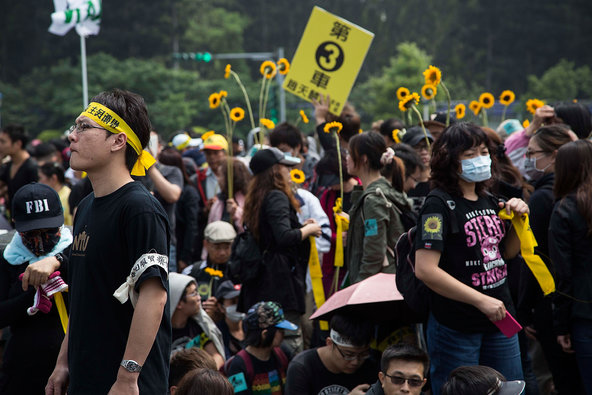Large crowds fill Taipei streets in protest over China trade bill

New York Times | March 30, 2014
Large crowds fill Taipei streets in protest over China trade bill
By AUSTIN RAMZY
More than 100,000 demonstrators took to the streets of Taipei on Sunday to protest efforts by the government to approve a trade pact with China and to show support for the students who have occupied Taiwan’s Legislature for nearly two weeks.
Organizers estimated that the crowd had swelled to more than 500,000 people on the streets around the Presidential Office Building by early afternoon. The police counted 116,000 demonstrators by 4 p.m., according to Taiwan’s Central News Agency, while some television news stations put the number as high as 700,000.
The trade pact would open up dozens of service sectors in Taiwan and China to cross-strait investment. The protesters fear that local businesses will suffer, and that Taiwan will fall further under the influence of China, which considers Taiwan, a self-governed island, part of its territory.
They have accused President Ma Ying-jeou and his allies in the governing party, the Kuomintang, of forcing through the trade measure without allowing a review of its details. On March 18, hundreds of protesters, mostly college students, stormed the Legislature chamber. They have remained inside, with crowds of supporters filling the streets outside.
Though many demonstrators are opposed to the service trade pact, the most widely held complaint is that the measure has not been sufficiently examined. A telephone poll of 1,007 Taiwanese over the age of 20 conducted by Taiwan Indicators Survey Research before the occupation of the Legislature found that more than 70 percent of the respondents supported a line-by-line review of the pact.
“The level of public trust with President Ma and his government is really low throughout the country, and the review of this pact has been very cursory,” said Wu Hsiang-min, a 30-year-old engineer who joined the black-clad protesters on Sunday in central Taipei. “So I felt that if the students were willing to stand up on this matter, then I should stand up, too.”
On Saturday, Mr. Ma tried to respond to some of the students’ demands, saying he would back an itemized review of the trade pact and a law that would allow the Legislature to monitor agreements with Beijing more closely.

Mr. Ma said he was opposed to demands for the withdrawal of the pact, which was signed by quasi-governmental organizations representing Taiwan and China last year but still needs legislative approval. The president has said that the deal is necessary for Taiwan’s economy to maintain its competitiveness with regional rivals like South Korea, and that failure to approve it could harm Taiwan’s ability to enter into other trade agreements.
Mr. Ma’s Kuomintang controls the Legislature, with 65 of 113 seats, so it can eventually win approval of the measure. Protesters had called for Mr. Ma, as the party’s chairman, to relax rules that enforce discipline on votes by its members in the expectation that some Kuomintang legislators might oppose aspects of the pact. Mr. Ma said Saturday that such decisions were made by the party’s legislative caucus and were not directly under his control.
On Saturday, a much smaller demonstration of a few thousand people gathered outside Taipei’s central train station to show support for Mr. Ma’s government. “I want the students to leave the Legislature,” said Chang Wei-feng, 24, from Taichung in central Taiwan. “You can’t use this sort of occupation in the middle of a democratic process.”





